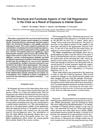 4 citations,
August 2018 in “Facial Plastic Surgery Clinics of North America”
4 citations,
August 2018 in “Facial Plastic Surgery Clinics of North America” Platelet-Rich Plasma (PRP), a protein-rich extract from a patient's blood, shows promise in improving hair density, thickness, and quality, but the best method of use and number of treatments needed for noticeable results are still unclear.
[object Object] May 2021 in “Research journal of topical and cosmetic sciences” TrichovitalsTM improved skin, hair, and nail health in adults after 12 weeks.
 May 2021 in “Journal of Dermatology and Cosmetic”
May 2021 in “Journal of Dermatology and Cosmetic” Low-power lasers can prevent hair death and increase hair growth in wounds caused by freezing in rats.

Two nutritional supplements improved hair growth and reduced hair loss in women with hair loss conditions.
 4 citations,
December 1997 in “Clinical Endocrinology”
4 citations,
December 1997 in “Clinical Endocrinology” Spironolactone may help reduce hair loss in androgenic alopecia.
 1 citations,
August 1999 in “PubMed”
1 citations,
August 1999 in “PubMed” Finasteride 1 mg effectively treats male pattern hair loss with minimal side effects.
 3 citations,
June 2019 in “Journal of Bangladesh Society of Physiologist”
3 citations,
June 2019 in “Journal of Bangladesh Society of Physiologist” People with hair loss often have lower levels of zinc and copper in their blood.
 3 citations,
December 2019 in “Journal of Cosmetic and Laser Therapy”
3 citations,
December 2019 in “Journal of Cosmetic and Laser Therapy” PRGF treatments increased hair number and thickness in people with hair loss, with more injections leading to better results.
 12 citations,
March 2014 in “ISRN Pharmacology (Print)”
12 citations,
March 2014 in “ISRN Pharmacology (Print)” Minoxidil with tretinoin boosts hair growth most effectively, followed by minoxidil alone, and then ketoconazole.
7 citations,
August 2020 in “Plastic and reconstructive surgery. Global open” QR 678 and QR 678 Neo are safe and promote hair growth, potentially helping chemotherapy-induced hair loss.
 13 citations,
December 2017 in “Journal of Cosmetic and Laser Therapy”
13 citations,
December 2017 in “Journal of Cosmetic and Laser Therapy” Low-level laser therapy can stimulate hair growth more effectively than fake devices, but patient satisfaction is similar for both. Results should be taken with caution due to small study sizes and differences between studies. More research is needed.
 21 citations,
January 2012 in “Annals of Dermatology”
21 citations,
January 2012 in “Annals of Dermatology” 17α-Estradiol solution safely improves hair density and thickness in female pattern hair loss.
 1 citations,
October 2021 in “Gene, cell and tissue”
1 citations,
October 2021 in “Gene, cell and tissue” Grape sap may help reduce hair loss and promote hair growth in rats.
 100 citations,
June 2006 in “British Journal of Dermatology”
100 citations,
June 2006 in “British Journal of Dermatology” Hair loss severity relates to increased miniaturization in female pattern hair loss.
 3 citations,
April 2017 in “Dermatologic Surgery”
3 citations,
April 2017 in “Dermatologic Surgery” Laser hair removal can be an effective last-resort treatment for men with stubborn Alopecia Areata who want to be uniformly bald.
[object Object] 11 citations,
August 2021 in “The journal of investigative dermatology/Journal of investigative dermatology” A gene mutation causes early keratinocyte maturation leading to hair loss in Olmsted syndrome.

Botulinum toxin-A injections in the scalp can reduce hair loss and promote new hair growth in men with certain types of baldness.
 165 citations,
December 2002 in “Molecular and Cellular Endocrinology”
165 citations,
December 2002 in “Molecular and Cellular Endocrinology” Male hormones, particularly DHT, are linked to male pattern hair loss, and treatments like finasteride can help, but they don't work for postmenopausal women's hair loss, which may have different causes.
 2 citations,
March 2023 in “Skin research and technology”
2 citations,
March 2023 in “Skin research and technology” Temporal triangular alopecia in infants is mostly seen in males at birth, with unique features that help with diagnosis.
 May 2015 in “Hair transplant forum international”
May 2015 in “Hair transplant forum international” Androgenetic alopecia causes hair loss by shrinking hair follicles due to androgens, with the connection between the muscle and hair follicle determining if the loss is reversible.
 2 citations,
January 2022 in “Journal of Cosmetic Dermatology”
2 citations,
January 2022 in “Journal of Cosmetic Dermatology” QR678 Neo® is a safe and effective treatment for hair loss in men and women.
 January 2023 in “Springer eBooks”
January 2023 in “Springer eBooks” New understanding of hair loss could lead to better treatments.
 24 citations,
January 2020 in “International Journal of Molecular Sciences”
24 citations,
January 2020 in “International Journal of Molecular Sciences” Some plants with flavonoids may help treat hair loss and promote hair growth.
 18 citations,
August 2019 in “Journal of Cosmetic Dermatology”
18 citations,
August 2019 in “Journal of Cosmetic Dermatology” PRP therapy may increase hair density in pattern hair loss without serious side effects, but more research is needed.
 3 citations,
April 2011 in “Dermatologic Surgery”
3 citations,
April 2011 in “Dermatologic Surgery” Different women have various natural hairline shapes, and understanding this is important for designing hair transplants.
 2 citations,
August 2019 in “Asian journal of pharmaceutical and clinical research”
2 citations,
August 2019 in “Asian journal of pharmaceutical and clinical research” Cinnamon bark extract may help prevent weight loss and hair loss in breast cancer patients during chemotherapy and is safe to use.
 63 citations,
January 1992 in “Experimental Neurology”
63 citations,
January 1992 in “Experimental Neurology” Chickens exposed to loud noise can quickly regain hearing mostly due to repair of the tectorial membrane, not just hair cell regeneration.
 62 citations,
April 2004 in “Expert Opinion on Pharmacotherapy”
62 citations,
April 2004 in “Expert Opinion on Pharmacotherapy” Finasteride effectively treats male pattern baldness, improving hair growth and density.
 January 2024 in “International Journal of Health Science”
January 2024 in “International Journal of Health Science” Scalp cooling and low-power light therapy show promise in reducing chemotherapy-induced hair loss but need more research.
 6 citations,
September 2019 in “Journal of Cosmetic Dermatology”
6 citations,
September 2019 in “Journal of Cosmetic Dermatology” Laser treatment effectively increases hair density and thickness in androgenic alopecia.


























